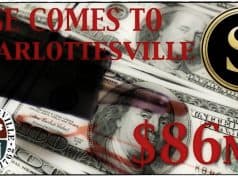By Louis Schultz
Charlottesville is often celebrated for it’s small town charm, its history, it’s uniqueness.
Charlottesville might just be unique in a way that no one will be celebrating though. It is quite possibly the first city in the history of the Commonwealth to have elected its entire governing body illegally. The fallout from that mistake could be significant.
The General Assembly has the power to set the time of elections under Article II Sec. 4 of the Constitution of Virginia.
In 2000, the General Assembly passed a law allowing some localities to pass ordinances moving their council elections to November. That is Virginia Code § 24.2-222.1
Prior to the passage of that law, Virginia Code § 24.2-222 required all localities to hold those elections in May, “notwithstanding any other provision of law, general or special.”
That phrase “notwithstanding any other provision of law, general or special” is highly important! We will get back to that shortly.
“Special” laws are mostly, if not exclusively, city and town charters. Article VII, § 2 of the Constitution of Virginia authorizes the General Assembly “to provide by special act for the organization, government, and powers of any county, city, town, or regional government.” Charters are such special acts.
The legislature may enact municipal charters that “establish laws for the organization and government of one city which differ from those enacted for another city.”
The legislature may enact municipal charters that confer upon localities “rights and powers different from those conferred by general statutes.” That means those special laws would usually take precedence over general laws which would otherwise apply.
The inclusion of that key phrase “notwithstanding any other provision of law, general or special” or something similar in a statute means that particular section of the Code was intended by the General Assembly to take precedence over all other laws on the subject including local charters if there is any conflict.
The significance off that phrase not being included in a statute is probably best explained by current Virginia Attorney General Mark Herring in his Opinion of the Attorney General from July 2014. Although it pertains to a different section, that opinion discusses Title 24.2 of the Code of Virginia from which § 24.2-222.1 comes.
The relevant portion is entitled “Section II. The Statutory Supersession of the Charter Provision,” and it can be found on pages 3-4. It is essential reading!
Herrings says “Even if a conflict existed, §§ 24.2-230 through 24.2-238, which are general laws, could not be construed as superseding Article III, § 1(4) of the Charter, which is a special act.” That is because it those sections don’t contain any statement of an intent that they do so.
It just so happens that Section 5(d) of Charlottesville’s Charter requires May council elections in conformity with the statute that used to require them in all localities. There is no constitutional requirement that a charter even mention the subject.
In 2004 Charlottesville’s City Council passed an ordinance, Charlottesville Code Sec. 2-35, which purported to change the council election time from May to November under authority claimed to have been granted to the City under Virginia Code § 24.2-222.1.
The problem is that § 24.2-222.1 doesn’t contain that key phrase, “notwithstanding any other provision of law, general or special.” It doesn’t have any text that might even be stretched to imply that or a similar meaning.
Therefor the statute can NOT be interpreted as authorizing a change to an election date that does not conform with the city’s charter. VA Code § 1-248 says “Any … ordinance… of any governing body… shall not be inconsistent with the Constitution and laws of the United States or of the Commonwealth.
Charlottesville’s Charter is the law of the Commonwealth concerning the time of council election in the city. Because of the inconsistency, the ordinance purporting to move election dates was void at the time of its passage and remains so.
Section 5 of its charter defines who Charlottesville’s governing body is. “The municipal authorities of the said city shall consist of a council of five members, one of whom shall be mayor,… who shall be elected by the qualified voters of the City of Charlottesville at elections held at the intervals and on the day prescribed for such elections by the laws of the state.
Unless the election takes place “on the day prescribed for such elections,” it cannot produce a member of the governing body as defined by the charter. Not a single person who currently holds office as a Charlottesville city councilor was elected as the charter requires.
As further evidence that the City of Charlottesville has far exceeded any authority granted to it by the General Assembly, the City has acted as though Virginia Code § 24.2-222.1 has repealed Charlottesville Charter Sec. 9 which states “At its first meeting in July, 1972, and biennially thereafter, the council shall elect one of its members to act as president, who shall preside at its meetings and continue in office two years.” That president is the city’s mayor.
VA Code § 24.2-222.1 only pertains to mayors whose elections by the public are provided for by charters. It could not possible be construed as repealing or modifying a charter provision establishing the method by which the city’s mayor is to be elected by the council from among its members.
That election must take place in July according to the Charter and to Charlottesville Code Sec. 2-39 but it has been happening in January since the adoption of Charlottesville Code Sec. 2-35. On January 4, 2016 City Council elected Mike Signer as Mayor for what it said would be a two year term.
VA Code § 15.2-100 says – “Except when otherwise expressly provided by the words, “Notwithstanding any contrary provision of law, general or special,” or words of similar import, the provisions of this title (this title referring to all of 15.2) shall not repeal, amend, impair or affect any power, right or privilege conferred on counties, cities and towns by charter.”
VA Code § 15.2-1422 within title 15.2 states “Unless the chairman or mayor is elected by popular vote, every governing body, at its first meeting after taking office, shall elect one of its number as presiding officer.” It does not say “Notwithstanding any contrary provision of law, general or special,” or words of similar import.
Charlottesville’s Charter Sec. 9 is neither affected by Virginia Code § 24.2-222.1 nor by VA Code § 15.2-1422 and therefor Council must elect a mayor in July. That is inconsistent with November city council elections followed by newly elected councilors taking office in January.
It would be absurd to concluded that the General Assembly ever had any intent of allowing cities to generally disregard their charters or to create such chaos in doing so, particularly though a statute that makes no mention in any way of such an intent.
The need for General Assembly oversight couldn’t be clearer than in Charlottesville’s case. Left to its own devices, and the unsupervised guidance of its City Attorney and others, the city has allowed chaos to reign and it may take years to repair the damage.









[…] another manifestation of ongoing institutional turmoil at Charlottesville City Hall, General Registrar, Melissa A. Morton, has resigned her position, effective April […]